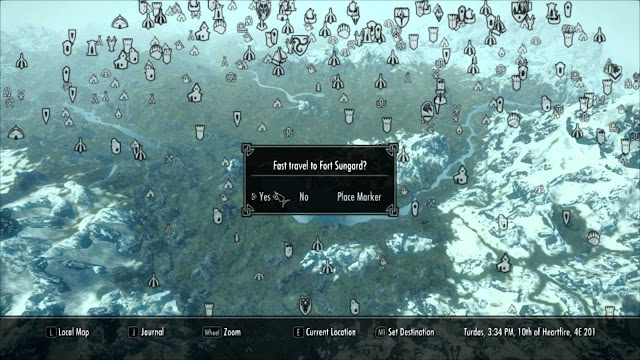Fast Travel in Videogames is Not Pointless and Does Not Break Immersion
“Fast Travel: noun a video game mechanic that allows a player character to instantaneously travel between two points within the game world without having to traverse that distance in real time, verb the act of a player character instantaneously travelling between two points within the game world without traversing that distance in real time.”
The ability to fast travel is now a staple in modern video games. It allows players to travel between any two points on the map without having to literally travel between those points whether it’s by horseback, parkour, or whatever type of movement the game employs. It is increasingly rare nowadays to find “open-field” games without fast travel, and that’s because it feels like you can’t release a big budget triple AAA and even larger scale indie titles without fast travel.
The 8th generation of consoles saw the rise of open world games, fuelled at the start of the generation by improved tech and the recently released Grand Theft Auto V in September of 2013. The GTA franchise allowed players to explore a large and expansive world at their will, and as the game found immense success, the whole industry followed suit. The Witcher 3, Horizon Zero Dawn, Red Dead Redemption 2, Marvel’s Spider-Man, Assassin’s Creed, and Fallout are just some examples of the many open world games released this generation.
Fast travel is now so common in videogames, that I can’t imagine playing an open-world game that is missing this feature. Fast travel allows players to cut real time play which would be wasted travelling from point A to point B, and allow them to set their own pace to the journey.
Fast travel enables players to change the tempo of the game to their own will. If the next story mission is located halfway across the map, the player can choose to instantly travel there, instead of slowly making their way across the world, and with modern videogames forever striving to create larger and more expansive worlds, this can become a major time sink. For example, in Ghost of Tsushima travelling from some location in Act 2 or 3, all the way back to Act 1 can take a good 5 to 10 mins, which could be saved by just fast travelling to the particular location. On the other hand, in a game like Spider-Man on PS4, where traversal is so enjoyable and quick, fast travel can lose some of its reason to exist, but nonetheless, can come in handy while trophy hunting or for someone who just wants to experience the game’s story. Fast travel is not pointless as it allows players to fast track though monotonous and time-consuming chunks of gameplay and allow them to skip to the juicy and fun bits.
One might argue that fast travel can break immersion in the game world that developers strive so hard to achieve. By allowing the player to instantly skip huge chunks of the game world, the player misses out on organically exploring the points of interests that developers have so methodically placed on routes that they know players are going to have to take, like specifically placed weapons or tools that can help the player against an upcoming boss battle. In addition, games like The Legend of Zelda: Breath of the Wild, that are essentially in their purest form, exploration simulators, can be massively hurt by the inclusion of a fast travel mechanic. With exploration and the sense of discovery at the crux of the gameplay formula, fast travel can rob the player of this aspect of gameplay. Beautiful vistas and carefully crafted lore can be completely missed by players that stick to the highway that leads straight to the next story mission. The highway of fast travel.
In many games, but more specifically RPGs, fast travel can break immersion. Since the player is roleplaying as a certain character, and organically interacting with the world and its inhabitants is such an important part of these types of games, fast travelling can remove all of this from the gameplay experience. Players can miss side quests that build upon the storyline of the game or just not witness the way the world changes based on the choices that they so carefully make.
Regardless of the way and manner in which developers craft their game worlds, the final say always falls in the player’s hand. Want to go and continue the main story? The player can choose to beeline to my destination and not stop even if they see something interesting. Want to organically immerse myself in the word? The player can walk at a snail’s pace taking in every single pixel of the environment. Even if a game completely gets rid of fast travel, if a player wants to solely head to a specific place and not do anything along the way, the player can do so, even if the developers throw side quest after side quest, and NPC after NPC, along the path. By including fast travel points in the game, the player can instead instantaneously go to their destination, without having to physically put the time and effort into moving the left stick forward or holding down the W key.
Fast travel annoys some players, with the logic that it breaks immersion, but in reality, only choosing to fast travel will break immersion. If someone wants to organically explore the world, be my guest, but if someone wants to solely go to a single point on the map and ignore everything else, they should have the option to do so. Fast travel is not pointless as it provides much needed accessibility in the large and expansive games of today, and it definitely does not break immersion.







To summarize your post: "if you don't like it, don't use it",
ReplyDeleteThe tag line is kinda misleading since you don't deny that Fast-traveling can be immersion breaking.
But games are crafted in a manner to encourage a certain playstyle, everything built in is a statement, you can't blame other players for ruining their own fun by using the functions implemented by the developers, so your statement boils down to that fast-traveling should be a standard for open world games, because only the use is bad, not it's existence but that's not how video game design works from an developer perspective, in the end players will always seek out the path of least resistance and players who are invested in the world you have so carefully crafted, become punished for not using it. MMO's are a shining example for this and shows how much simplified a genre has become because of all these "options" if you have to set conditions for yourself there is an awful disconnect between the communication and discussions of said games between players, if you want to play most optimal of course you include these options in your playstyle and certain departments and features become redundant and underutilized, a well crafted round experience looks different to me .It feels wrong stripping yourself down and when you have no fun, developers are not in the right saying "why have you used the systems we layed out to you?"
If the developer for example intended a dangerous open world, there is no excuse for the inclusion of an quick-travel system, when you can use it to get out of all danger it's not a choice at this point anymore, since the possibility is already branded in the back of an players mind.
the developer simply failed to achieve their goal, to craft an experience, that delivers their intended experience guaranteed.
So in that aspect I think your take on the topic is extremely naive.
So just to make that clear, your topic isn't about fast travel, it's just about giving players options even if they might be harmful for the intended experience. You can bring this topic up for everything, so the point of discussion is shifted towards options, not about fast-traveling which makes this a pretty bland topic to discuss.
DeleteI could make the same statment saying "Invincibility does not make the game easy and boring" writing that building in an option for player who just want to enjoy the story/visuals is beneficial and only the use of it can make it boring. So I don't see a point why this is about fast-traveling.